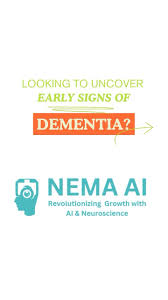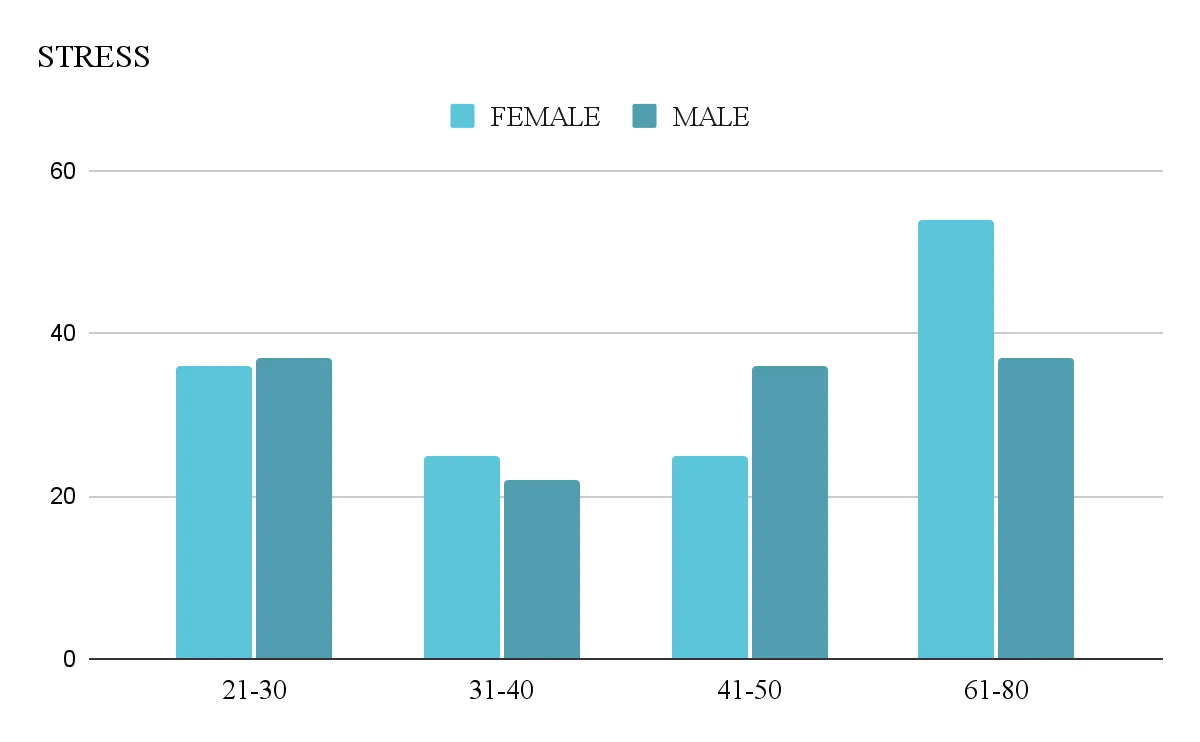Cognitive test for Dementia

NEMA AI
The loss of cognitive abilities, such as thinking, remembering, and reasoning, to the point where it interferes with day-to-day activities, is known as dementia. Dementia patients may experience emotional instability and personality changes.
Early detection of dementia is crucial because:
Therapy accessibility: People who receive an early diagnosis have easier access to drugs and treatments that might help control symptoms and possibly slow the course of their illness.
Lifestyle changes: According to the National Institutes of Health (NIH), early detection can help with lifestyle changes, including exercise and dietary improvements, which can help control symptoms and possibly halt the disease's course.
Reversible causes: According to the National Institutes of Health (NIH), early detection can assist in identifying reversible causes of cognitive impairment, such as vitamin deficiencies or adverse drug reactions, which can be treated to enhance cognitive function.
Planning for the future: People who receive an early diagnosis are able to make well-informed decisions regarding their legal, financial, and medical affairs while they are still competent.
Living arrangements: It helps people and their families to think about and prepare for potential future living arrangements, such as residential facilities or in-home care.
Support systems: Prompt detection makes it easier to create support systems, such as professional care and support groups, which can offer important practical and emotional help.
A cognitive test looks for issues with your ability to think clearly. Answering simple questions and completing easy tasks are part of the test. Before taking this test, you do not need to study.
Your brain's capacity to process all of the data it receives from your senses is known as cognition. The components of cognition include:
- Skills for paying attention.
- The ability to make decisions
- Evaluation
- Studying
- Reasoning
- Recalling
- Considering
- Comprehending
Cognitive test
A cognitive test comprises of a few exercises or questions that you must complete as accurately as possible. You are not required to study or conduct any kind of preparation for this test. Simply respond to your provider's directions or do what they say. The entire process should just take a few to fifteen minutes. Usually, it is a component of a routine medical examination.
In dementia care, cognitive tests are essential because they aid in the detection of cognitive impairment, evaluation of its severity, and tracking of its development over time.
The goal is to assess a person's cognitive capacities, including language, executive processes, memory, and attention, according to Metropolis Healthcare.
The Cleveland Clinic states that the methods used include standardized tests and surveys given by medical professionals. It shows strengths and weaknesses by providing scores on several cognitive categories. If there are cognitive problems that need more research, these scores can assist in identifying them. However, no particular illness or condition may be diagnosed by cognitive testing. The reason, extent, and location of impairment are not disclosed by them.
According to the same source, the goal of clinical diagnosis is to identify a particular illness, injury, or condition using physical examination results, patient history, signs and symptoms, and sometimes additional testing.
Techniques include compiling data from multiple sources:
Examining current and previous ailments, prescription drugs, and family history is known as medical history. Evaluating the patient's general health as well as any particular issues.
Cognitive tests are performed to evaluate cognitive function when cognitive impairment is suspected. Additional tests are also conducted to confirm or rule out particular disorders; imaging tests (such as MRI or CT scans), blood tests, and biopsies may be employed.

Why cognitive tests are used in dementia
Dementia-causing illnesses cannot be diagnosed with a single cognitive test. To identify the origin of symptoms, doctors employ a variety of tests and evaluations, many of which involve different types of questioning.
Cognitive tests evaluate and monitor changes in thinking skills like memory, language, and problem-solving in dementia diagnosis and treatment. These assessments aid in detecting cognitive impairment, assessing its degree, and tracking its development over time. Additionally, they can assist in distinguishing dementia from other illnesses that could have same symptoms.
The importance of cognitive tests in dementia are: Advantages for family awareness and treatment planning, Tests are useful in determining the degree of cognitive decline and the severity of dementia. Frequent cognitive testing enables medical practitioners to track changes in cognitive capacity throughout time.
Cognitive tests for dementia evaluate a range of mental skills, including problem-solving, language, and memory. Some of these tests are even available for self-assessment, and medical professionals can perform them. The Mini-Mental State Exam (MMSE), Mini-Cog, and Montreal Cognitive Assessment (MoCA) are frequently utilized assessments.
Typical Cognitive Tests and Their Administration Methods:
Mini-Cog: This brief exam involves recalling three words, drawing a clock with a certain time, and then recalling the words again.
MoCA: This 15-minute test assesses executive function, language, memory, and visuospatial abilities.
MMSE: This test, which usually lasts ten minutes, evaluates orientation, registration, attention, computation, recollection, and language.
SAGE test: A physician can score this self-administered exam after it has been downloaded, printed, and taken at home.
Assessment of cognitive test:
Cut-off scores for cognitive tests indicate normal, mild, moderate, or severe cognitive impairment. The results are interpreted by comparing a person's performance to predetermined norms. Specialists such as neurologists, psychiatrists, or neuropsychologists must do additional evaluations as these tests are screening instruments and not diagnostic in and of themselves. In order to look into possible underlying causes, test results can also help determine whether more medical testing, such as blood or MRI examinations, are necessary.
Normative Data: Standardized processes and normative data gathered from a sizable population are used in the creation of cognitive tests.
Cut-off Scores: Cut-off scores are used in tests to distinguish between different levels of impairment and normal cognitive function. For instance, modest cognitive impairment may be indicated by a Montreal Cognitive Assessment (MoCA) score of less than 26.
Normal vs. Impaired: While a score below the normal range may signal impairment, a score within the normal range indicates that the person's cognitive abilities are operating as they should.
Levels of Impairment: According to Metropolis Healthcare, cognitive impairment can be classified as mild, moderate, or severe depending on test results; higher scores often indicate less impairment.
How to Interpret Poor Performance: According to the National Institutes of Health (NIH), it's important to keep in mind that subpar performance on a cognitive test does not necessarily indicate a true cognitive impairment and that additional research is frequently required.
How Nemaai Can Assist
One of the most difficult things for families and caregivers dealing with dementia is identifying the symptoms early and receiving help in a timely manner. Although traditional cognitive tests are helpful, they are typically only used in clinical settings and frequently only after symptoms have become obvious and interfered with day-to-day functioning. Missed chances for early intervention, planning, and emotional readiness may result from this delay. Nemaai fills this void by providing a technologically advanced method that combines common accessibility with medical knowledge. Individuals can participate in Nemaai's exams from the convenience of their homes rather than waiting for annual physicals or referrals to specialists.
In order to ensure that the tests identify tiny issues with memory, attention, or decision-making that could otherwise go unreported, the platform uses organized cognitive tasks that were created with input from neuroscientists and doctors.
Nemaai's ability to make outcomes easier for families is another of its advantages. Reports from cognitive tests frequently contain technical terms that are difficult for non-specialists to understand. Nemaai converts this into clear insights that illustrate not just the possible locations of problems but also how they could affect day-to-day activities. For instance, the results might show how this could result in difficulties with bill management, multi-step instructions, or appointment recall, rather than only highlighting "deficits in executive function.
If you or your loved one is concerned about memory changes or cognitive health, don’t wait, book a consultation with Nemaai today and take the first step toward clarity and peace of mind.

